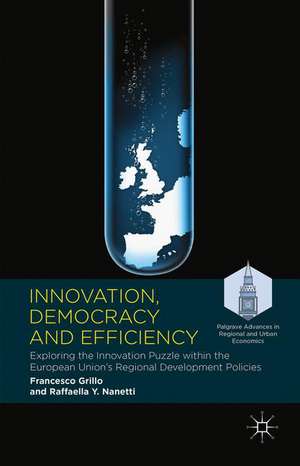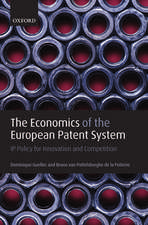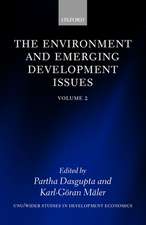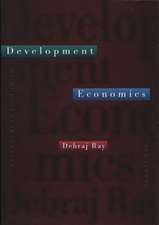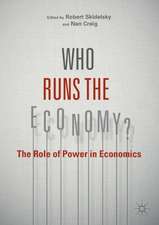Innovation, Democracy and Efficiency: Exploring the Innovation Puzzle within the European Union’s Regional Development Policies: Palgrave Advances in Regional and Urban Economics
Autor Francesco Grillo, Raffaella Y. Nanettien Limba Engleză Hardback – 6 ian 2016
Grillo and Nanetti attempt to understand the reasons that lie behind differences in performance. Their results show that better performing innovation strategies require the following factors: clear choices of locally congruent smart specialization; strong capacity of public investment to stimulate additional private investment; clear distribution of responsibilities for decision-making and independence of policy implementation from political interference; and problem solving partnerships amongst innovators, universities, and governments that pre-exist the programmes. These factors point to a relationship between democracy (defined as openness of policy-making) and innovation (as technology-enabled growth) which is explored throughout this book.
Preț: 641.53 lei
Preț vechi: 754.74 lei
-15% Nou
Puncte Express: 962
Preț estimativ în valută:
122.76€ • 131.27$ • 102.35£
122.76€ • 131.27$ • 102.35£
Carte tipărită la comandă
Livrare economică 18 aprilie-02 mai
Preluare comenzi: 021 569.72.76
Specificații
ISBN-13: 9781137449658
ISBN-10: 1137449659
Pagini: 237
Ilustrații: XVII, 237 p.
Dimensiuni: 140 x 216 x 16 mm
Greutate: 0.45 kg
Ediția:1st ed. 2016
Editura: Palgrave Macmillan UK
Colecția Palgrave Macmillan
Seria Palgrave Advances in Regional and Urban Economics
Locul publicării:London, United Kingdom
ISBN-10: 1137449659
Pagini: 237
Ilustrații: XVII, 237 p.
Dimensiuni: 140 x 216 x 16 mm
Greutate: 0.45 kg
Ediția:1st ed. 2016
Editura: Palgrave Macmillan UK
Colecția Palgrave Macmillan
Seria Palgrave Advances in Regional and Urban Economics
Locul publicării:London, United Kingdom
Cuprins
Table Of Contents
List Of Figures
List Of Tables
Preface
Acknowledgements
PART I: THE CHALLENGE OF INNOVATION POLICIES
1.1 Introduction
1.2 What Is Innovation After All And Why Definition Matters
1.3 Endogenous Growth Theory And Its Impact On Regional Development Policies
1.4 Empirical Evidence And The Puzzle Of Innovation
1.5 Why Innovation Policies May Fail
1.6 Merits And Limits Of Smart Specialization As The New Paradigm Of Innovation In EU Regional Policies
1.7 Democracy And Efficiency For Success In Innovation: A Conceptual Framework Of Partnerships
1.8 Organization Of The Book
PART II: REGIONAL CASE STUDIES AND INSTITUTIONAL SETTINGS
2.1 Exploring The Thesis: Six Case Studies And Their Approaches To Innovation Policies
2.2 Innovation And Regional Policies: Two Different Approaches
2.3 UK: The Paradox Of Innovation Policies In An Innovation Driven Economy
2.4 Spain: Innovation Policies As A Redistributive Tool
2.5 Comparing And Contrasting Institutional Settings
PART III: INNOVATION AND THE PUZZLE OF DEVOLUTION IN THE UK
3.1 Three Development Policies And An Institutional Puzzle
3.2 The Differences In Policy Performance: 2000-2013
3.2.1 The Design Of Development And Innovation Strategies
3.2.2 The Capacity To Make Choices
3.3 Devolution, Centralization And Innovation
3.3.1 Wales: A Failed Devolution
3.3.2 Yorkshire: A Development Strategy Led By Technocrats
3.3.3 Scotland: Conditions For Successful Decentralization
3.3.4 The Discontinuity Of Smart Specialization
3.4 Conclusions: Appropriate Institutional Levels For Successful Innovation Strategies
PART IV: SPAIN AND INNOVATION AS A POLITICAL IMPERATIVE
4.1 A Country Defined By Nationalism And Autonomy
4.2 Differences In Performance And Explanations
4.2.1 The Design Of Development And Innovation Strategies
4.2.2 The Making Of Choices
4.3 Efficiency And Democracy: The Relationship Revisited And Affirmed
4.3.1 Murcia: The Risk Of A Cost Based Economic Development Strategy
4.3.2 Castilla Y Leon: Merits And Limits Of The Centralized Approach To Innovation
4.3.3 Pais Vasco: A Pioneer Of Smart Specialization
4.3.4 Recent Evolution And Smart Specializing Regions
4.4 Conclusions: Political Conditions For Innovation As A Transformative Process
PART V: CONCLUSIONS: INNOVATION AS A POLITICAL PROJECT
5.1 The Challenge Of Innovation Policies
5.2 Innovation And Democracy: Preliminary Evidence From The Regional Cases
5.2.1 Thesis And Summary Of Findings
5.2.2 Discussion And Comparison Of The Institutional Cases
5.3 Escaping Path Dependence: Institutional Factors For Successful Innovation Based Development Policies
5.3.1 Programme Management As A Key Factor
5.3.2 Implementation Of The Partnership Principle
5.4 An Elaboration Of The 'Smart Innovation' Paradigm
5.5 Implications For EU Development Policies
5.6 Innovation And Democracy
5.7 Limits Of This Exploration And Agenda For Investigation
ANNEX 1 – BIBLIOGRAPHY AND RESOURCES
Index
List Of Figures
List Of Tables
Preface
Acknowledgements
PART I: THE CHALLENGE OF INNOVATION POLICIES
1.1 Introduction
1.2 What Is Innovation After All And Why Definition Matters
1.3 Endogenous Growth Theory And Its Impact On Regional Development Policies
1.4 Empirical Evidence And The Puzzle Of Innovation
1.5 Why Innovation Policies May Fail
1.6 Merits And Limits Of Smart Specialization As The New Paradigm Of Innovation In EU Regional Policies
1.7 Democracy And Efficiency For Success In Innovation: A Conceptual Framework Of Partnerships
1.8 Organization Of The Book
PART II: REGIONAL CASE STUDIES AND INSTITUTIONAL SETTINGS
2.1 Exploring The Thesis: Six Case Studies And Their Approaches To Innovation Policies
2.2 Innovation And Regional Policies: Two Different Approaches
2.3 UK: The Paradox Of Innovation Policies In An Innovation Driven Economy
2.4 Spain: Innovation Policies As A Redistributive Tool
2.5 Comparing And Contrasting Institutional Settings
PART III: INNOVATION AND THE PUZZLE OF DEVOLUTION IN THE UK
3.1 Three Development Policies And An Institutional Puzzle
3.2 The Differences In Policy Performance: 2000-2013
3.2.1 The Design Of Development And Innovation Strategies
3.2.2 The Capacity To Make Choices
3.3 Devolution, Centralization And Innovation
3.3.1 Wales: A Failed Devolution
3.3.2 Yorkshire: A Development Strategy Led By Technocrats
3.3.3 Scotland: Conditions For Successful Decentralization
3.3.4 The Discontinuity Of Smart Specialization
3.4 Conclusions: Appropriate Institutional Levels For Successful Innovation Strategies
PART IV: SPAIN AND INNOVATION AS A POLITICAL IMPERATIVE
4.1 A Country Defined By Nationalism And Autonomy
4.2 Differences In Performance And Explanations
4.2.1 The Design Of Development And Innovation Strategies
4.2.2 The Making Of Choices
4.3 Efficiency And Democracy: The Relationship Revisited And Affirmed
4.3.1 Murcia: The Risk Of A Cost Based Economic Development Strategy
4.3.2 Castilla Y Leon: Merits And Limits Of The Centralized Approach To Innovation
4.3.3 Pais Vasco: A Pioneer Of Smart Specialization
4.3.4 Recent Evolution And Smart Specializing Regions
4.4 Conclusions: Political Conditions For Innovation As A Transformative Process
PART V: CONCLUSIONS: INNOVATION AS A POLITICAL PROJECT
5.1 The Challenge Of Innovation Policies
5.2 Innovation And Democracy: Preliminary Evidence From The Regional Cases
5.2.1 Thesis And Summary Of Findings
5.2.2 Discussion And Comparison Of The Institutional Cases
5.3 Escaping Path Dependence: Institutional Factors For Successful Innovation Based Development Policies
5.3.1 Programme Management As A Key Factor
5.3.2 Implementation Of The Partnership Principle
5.4 An Elaboration Of The 'Smart Innovation' Paradigm
5.5 Implications For EU Development Policies
5.6 Innovation And Democracy
5.7 Limits Of This Exploration And Agenda For Investigation
ANNEX 1 – BIBLIOGRAPHY AND RESOURCES
Index
Recenzii
Newspaper reading is in decline, but people are more informed. Revolutions are led through Facebook. Citizens and stakeholders in the EU regions also demand to be part of the conversation when shaping the future. To find out how this works, read Grillo and Nanetti's thought provoking insight on democratic participation in setting EU innovation policies in this new brave world.'
– Professor Birgitte Andersen, CEO and CoCreator, Big Innovation Centre, London, UK
'There is a direct link between the quality of a democracy and its ability to innovate. In this book Francesco Grillo and Raffaella Y. Nanetti analyse the complexity of such a link. As a result, they offer to governments, academics and innovators a clear model of how a coherent innovation system should work in the era of interdependence. Their work is inspirational for policy makers in Italy and Europe.'
– Stefania Giannini, Minister of Education, Universities and Research, Italy
'A must readfor all academics and policy makers interested in understanding the relevance and defining features of successful innovation policies in today's globally interdependent economy under the accelerating pace of technological change.'
– Mikel Landabaso, Acting Director Directorate H, Inclusive Growth, Urban and Territorial Development and Northern Europe, Regional Policy, European Commission, Brussels, Belgium
'In this very useful book Francesco Grillo and Raffaella Y. Nanetti recognize that innovation is as much a political and institutional project as a technical one. Would-be innovators – and the local, national or regional policy makers who want to help them – ignore this insight at their peril. Political coalitions, leadership and institutional design matter, as Grillo and Nanetti show through well-selected case studies.'
– Ernest Wilson, Dean and Walter Annenberg Chair in Communication, University of Southern California, USA
– Professor Birgitte Andersen, CEO and CoCreator, Big Innovation Centre, London, UK
'There is a direct link between the quality of a democracy and its ability to innovate. In this book Francesco Grillo and Raffaella Y. Nanetti analyse the complexity of such a link. As a result, they offer to governments, academics and innovators a clear model of how a coherent innovation system should work in the era of interdependence. Their work is inspirational for policy makers in Italy and Europe.'
– Stefania Giannini, Minister of Education, Universities and Research, Italy
'A must readfor all academics and policy makers interested in understanding the relevance and defining features of successful innovation policies in today's globally interdependent economy under the accelerating pace of technological change.'
– Mikel Landabaso, Acting Director Directorate H, Inclusive Growth, Urban and Territorial Development and Northern Europe, Regional Policy, European Commission, Brussels, Belgium
'In this very useful book Francesco Grillo and Raffaella Y. Nanetti recognize that innovation is as much a political and institutional project as a technical one. Would-be innovators – and the local, national or regional policy makers who want to help them – ignore this insight at their peril. Political coalitions, leadership and institutional design matter, as Grillo and Nanetti show through well-selected case studies.'
– Ernest Wilson, Dean and Walter Annenberg Chair in Communication, University of Southern California, USA
Notă biografică
Francesco Grillo is advisor to Italy's Minister for Education, Universities and Research on national innovation policies and is affiliated with the Scuola Superiore Sant'Anna, Pisa, Italy. He obtained his PhD in Political Economy at the London School of Economics, UK. He is Managing Director of Vision & Value (consulting firm), and advises the European Commission on innovation and smart specialization. Grillo is a regular contributor on Italy and Europe for the Italian newspaper Il Messaggero.
Raffaella Y. Nanetti is Professor Emerita of Urban Planning and Policy in the College of Urban Planning and Public Affairs, University of Illinois at Chicago, USA, and part of the core team of the Economic and Social Cohesion Laboratory in London, UK. She is an Associate of Italy's National Research Council (CNR) in Rome. Her main research areas are policy and programme evaluation, research design and methodology, and territorial development policies. She has directed community development studies and territorial assessment projects, sponsored among others by the European Union and the World Bank.
Raffaella Y. Nanetti is Professor Emerita of Urban Planning and Policy in the College of Urban Planning and Public Affairs, University of Illinois at Chicago, USA, and part of the core team of the Economic and Social Cohesion Laboratory in London, UK. She is an Associate of Italy's National Research Council (CNR) in Rome. Her main research areas are policy and programme evaluation, research design and methodology, and territorial development policies. She has directed community development studies and territorial assessment projects, sponsored among others by the European Union and the World Bank.
Textul de pe ultima copertă
Endogenous growth theory has significantly impacted most of the developing and developed countries, shifting priorities of industrial policies towards innovation. In line with this trend, the European Union significantly increased its budgetary allocation for R&D. However, statistical data show a weak correlation between R&D expenditure and the acceleration of economic growth. Regional innovation policies display divergent returns according to different institutional conditions and policy choices.
Grillo and Nanetti attempt to understand the reasons that lie behind differences in performance. Their results show that better performing innovation strategies require the following factors: clear choices of locally congruent smart specialization; strong capacity of public investment to stimulate additional private investment; clear distribution of responsibilities for decision-making and independence of policy implementation from political interference; and problem solving partnerships amongst innovators, universities, and governments that pre-exist the programmes. These factors point to a relationship between democracy (defined as openness of policy-making) and innovation (as technology-enabled growth) which is explored throughout this book.
Grillo and Nanetti attempt to understand the reasons that lie behind differences in performance. Their results show that better performing innovation strategies require the following factors: clear choices of locally congruent smart specialization; strong capacity of public investment to stimulate additional private investment; clear distribution of responsibilities for decision-making and independence of policy implementation from political interference; and problem solving partnerships amongst innovators, universities, and governments that pre-exist the programmes. These factors point to a relationship between democracy (defined as openness of policy-making) and innovation (as technology-enabled growth) which is explored throughout this book.
